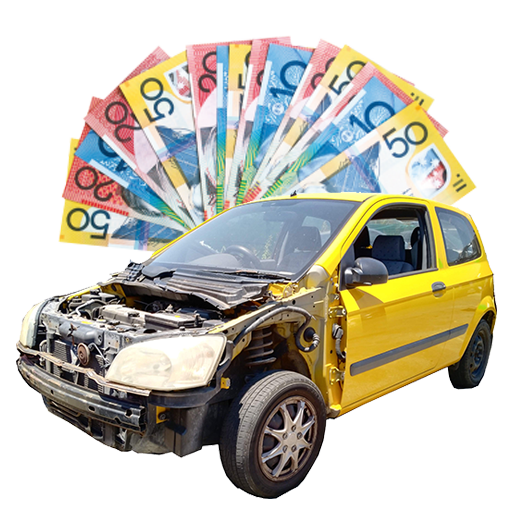When you hear the term "scrap value", it’s easy to picture a rusty car shell being weighed for its metal. But that’s only half the story. The true scrap value of a car is a combination of what its raw materials are worth and the value of any parts that can be salvaged and reused.
Think of it like this: your old car is a collection of resources. The steel chassis is the most obvious one, but the real money often lies hidden under the bonnet in parts like the engine, transmission, and especially the catalytic converter.
What Is the Scrap Value of a Car Explained
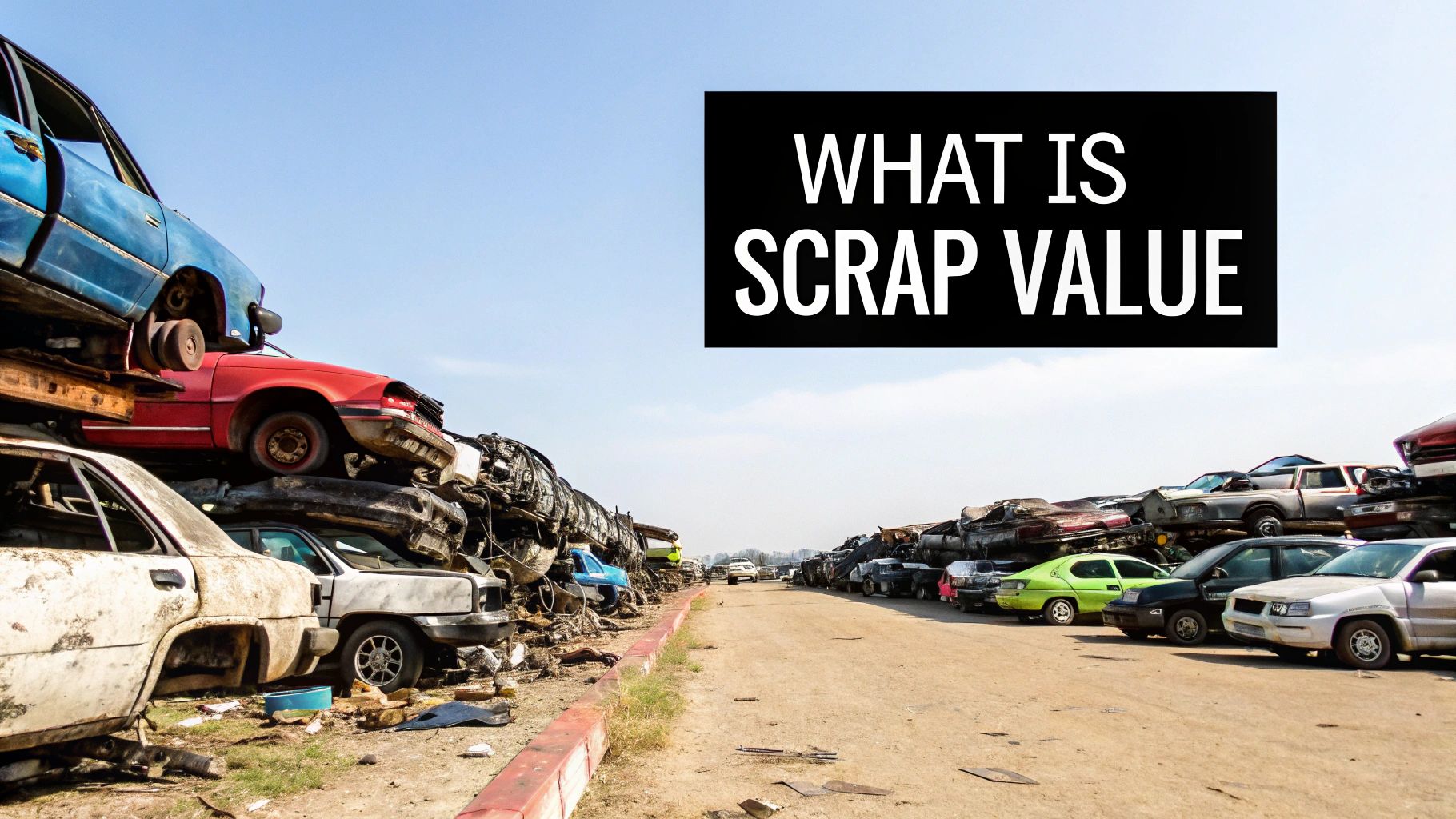
A common mistake is thinking that a car's scrap value is a flat rate based purely on its size. The reality is much more dynamic. The final offer you get is a careful calculation of a few key elements, and it can swing quite a bit from one day to the next.
At its heart, the value comes down to two main things:
- Scrap Metal: This is the baseline value. It’s calculated from the car's total weight in steel, aluminium, and other metals. These prices are constantly shifting with the global commodity markets.
- Salvageable Parts: This is where you can see a big jump in value. Components that are still in good working order—like an alternator, gearbox, or even seats and panels—can be refurbished and sold, adding a significant premium over the raw metal price.
In Australia, this means the payout for a scrap car can range from as little as $300 for a stripped-down, non-running vehicle to as much as $9,000 AUD for a car that, while old, still has plenty of high-demand working parts.
Realising the difference between these two components is crucial. An old but complete car with a running engine is always going to be worth far more to a wrecker than a similar model that has already been picked clean of its valuable parts.
Estimated Scrap Value by Car Condition
To give you a clearer picture, here’s a quick guide to what you might expect based on your vehicle's overall state. This table provides a rough estimate and helps you set realistic expectations before you start making calls.
| Vehicle Condition | Typical Payout Range (AUD) |
|---|---|
| End-of-Life (Non-runner, major damage) | $300 – $700 |
| Old but Running (Minor issues, high kms) | $600 – $2,500 |
| Damaged but Repairable (Accident damage) | $1,500 – $5,000 |
| Late Model with Valuable Parts | $4,000 – $9,000+ |
Remember, these are just ballpark figures. Your final offer will depend on the specific make, model, and the real-time demand for its parts and materials.
By understanding that your vehicle is more than just a lump of steel, you’re in a much better position to negotiate a fair price. If you're looking to broaden your knowledge on car ownership topics, these general auto resources are a great place to start.
The Key Factors That Determine Your Payout
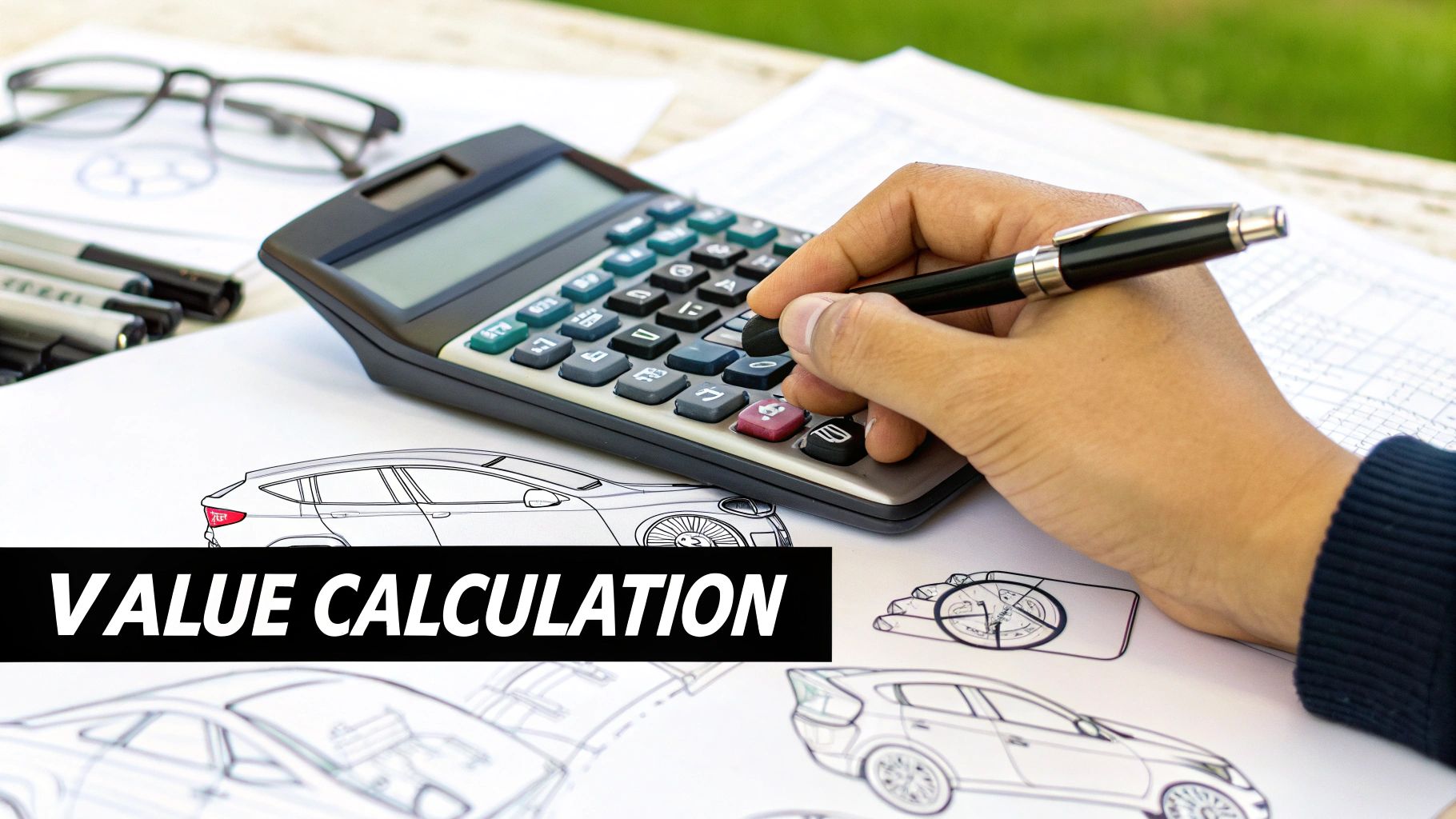
When a wrecker looks at your old car, they aren't just guessing a price. They're running a pretty specific calculation based on a handful of key elements. While every car's story is different, the same core factors almost always decide the final cash offer you'll get.
Getting your head around these will help you know a fair deal when you see one. The final figure is really a mix of what the car is worth in raw metal and what its parts are worth on the second-hand market. Let’s pull back the curtain on the five biggest things that influence your payout.
Vehicle Make, Model, and Year
First things first: what is your car? Its make, model, and year are the starting point for any valuation. Think about it – common cars like a Toyota Corolla or Holden Commodore are everywhere, which means there's a constant demand for their spare parts. Mechanics and DIY-ers are always hunting for alternators, door panels, and bumpers for these models.
On the flip side, a rarer or more obscure model might not have that built-in demand, which can affect its value. The car's age is also a major piece of the puzzle. Newer cars often have more valuable, modern components, while a much older classic might appeal to a niche collector's market.
The Condition of Key Components
Even if your car won't start, it's what's under the bonnet that can really boost your offer. A car that's a non-runner might seem useless, but if the engine and transmission are still in good shape, they're gold to a wrecker. These are high-demand, high-value parts.
A perfect example is the catalytic converter. It’s packed with precious metals like platinum and rhodium, making it one of the most valuable individual parts on any car. It can often be worth hundreds of dollars by itself.
So, a vehicle with a solid engine, a smooth-shifting transmission, and an intact catalytic converter will always be worth more than one with those parts missing or knackered.
Vehicle Weight and Size
Here’s where it gets back to basics. At its core, a car is a big lump of metal, and in the scrap world, weight equals money. A big ute or a hefty SUV has a lot more steel and aluminium in it than a little hatchback. Simple as that.
Because a huge chunk of a car's scrap value is based on its raw metal content, bigger vehicles will always have a higher starting price. Wreckers work this out based on the current price per tonne for scrap metal, giving them a baseline value before they even think about salvaging any parts.
Location and Local Demand
You might be surprised how much your postcode matters. A wrecker in a major city like Sydney or Melbourne has higher running costs, but they also have a massive local market of people looking for used parts. This competition can push up the price they’re willing to pay for your car.
Even how close you are to a port can play a part, as some scrap metal gets shipped overseas. Transport costs are always a factor too, which is why finding a good local car removal service usually gets you a better net result.
Current Scrap Metal Prices
Finally, the whole process is tied to the ups and downs of global commodity markets. The prices for steel, aluminium, and copper change daily based on supply and demand around the world.
This is why a quote you get one week might be slightly different the next. It’s not the wrecker trying to pull a fast one; their offers simply have to reflect the real-time market value of the materials they're buying. This makes timing a small but very real factor in how much cash you'll get.
How Car Wreckers Calculate Your Offer
Ever wondered what happens behind the curtain when you ask for a quote on your old car? It’s not just a number pulled from thin air. Car wreckers have a specific method for figuring out what your vehicle is worth, much like a jeweller assesses the value of old gold. They're looking at its raw materials and any parts that can be given a second life.
The whole process starts with a baseline value, which comes down to one simple thing: your car’s weight. This is its foundational worth as scrap metal, and it’s tied directly to the daily market price for materials like steel and aluminium. It’s why a hefty 4WD or ute will have a higher starting value than a little hatchback—it’s just got more metal in it.
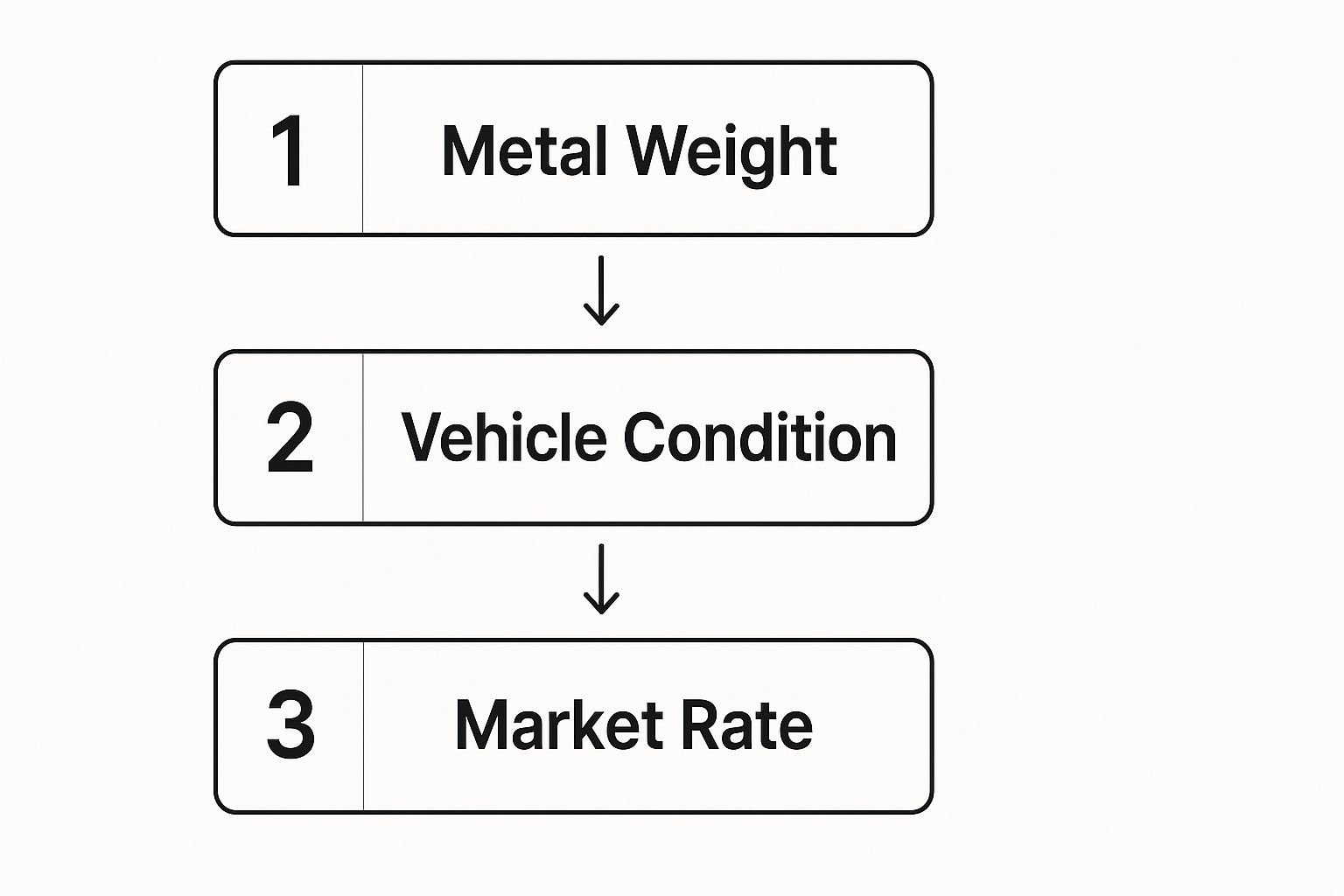
The Parts That Add Real Value
After weighing the metal, wreckers look for the hidden gems. This is where your offer can really start to climb. They’ll carefully assess which high-value components can be salvaged, cleaned up, and sold to someone looking for an affordable repair.
These are the parts that really move the needle on your quote:
- Engine and Transmission: If these core components are still in decent shape, they represent a significant chunk of the car’s value.
- Catalytic Converter: This is often the single most valuable part of a scrap car, thanks to the precious metals like platinum and palladium inside.
- Alternators, Radiators, and Starter Motors: These are bread-and-butter parts for mechanics, so there’s always a steady demand for them.
- Body Panels and Interior Bits: Doors, bumpers, and even seats in good nick can easily find a new home.
A car with a healthy engine and transmission is always worth more than just its weight in steel. Even if the car itself won't start, those functional parts are valuable assets that a wrecker can turn into cash.
Finally, the wrecker has to factor in their own operational costs. Think of things like towing the vehicle, the labour involved in carefully dismantling it, and the proper disposal of oils and fluids. The number you see in your final offer is the total value of the metal and parts, minus these essential business costs.
If you want a complete rundown of the journey from your driveway to the scrap yard, check out our guide on how to scrap a car.
Why Scrap Car Prices Vary Across Australia
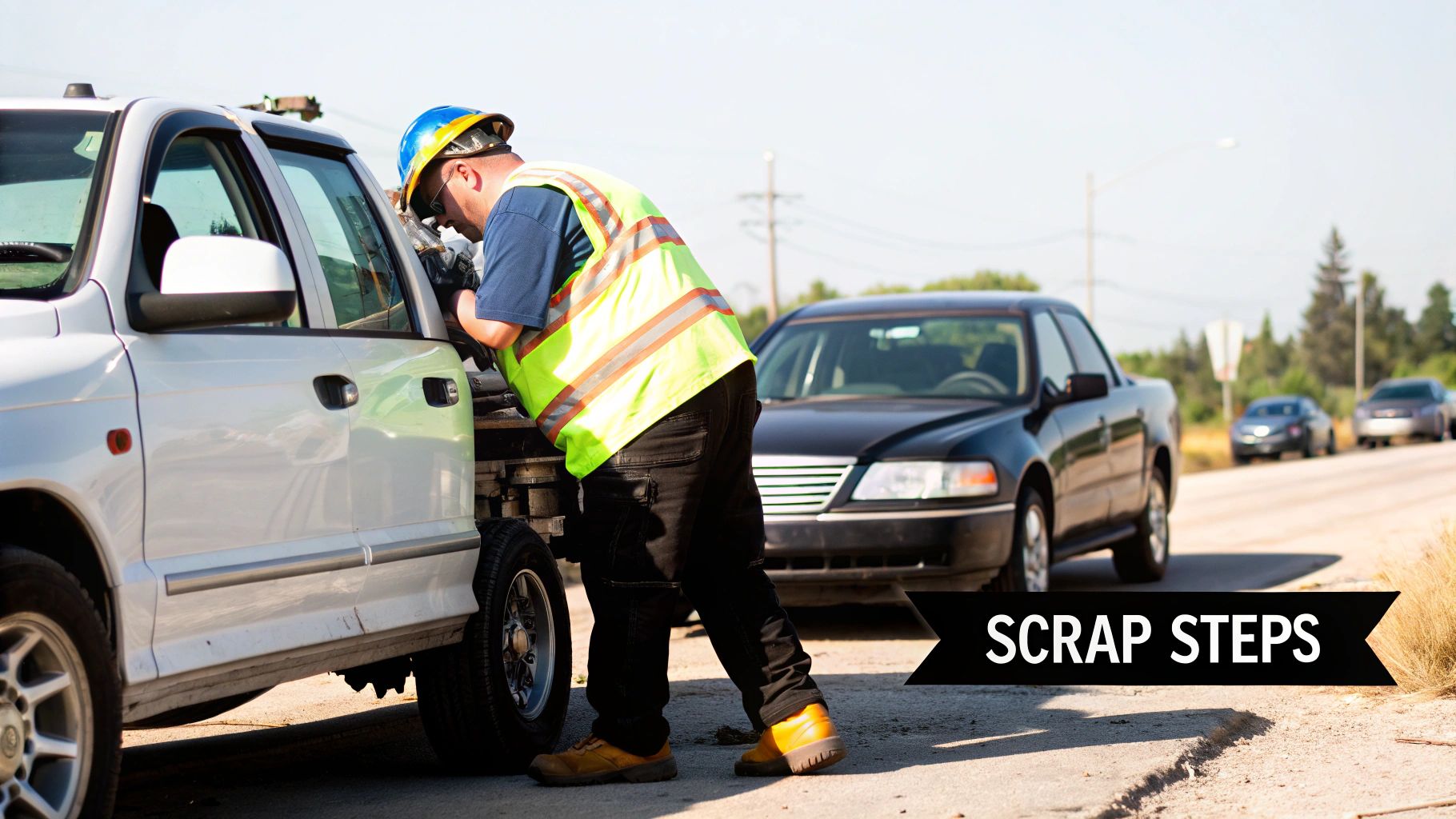
Ever wondered why the price you’re offered for your old car in Sydney might be worlds away from a quote in Adelaide? It’s not random. The scrap value of a car isn't a fixed, national number; it’s a living figure that dances to the tune of local market forces.
This all boils down to the classic principle of supply and demand, which plays out differently in every state. A major port city like Perth or Brisbane, for instance, is more plugged into the global scrap metal trade. If international demand for steel spikes, wreckers there can get top dollar for their bulk metal, and that good fortune often trickles down to a better offer for your car.
Local Automotive History and Demand
On the other hand, some cities have a unique flavour all their own. Take Adelaide, with its deep roots in Australia’s car manufacturing past. This history has created a robust local demand for parts from specific older, locally-made models that you just don't see elsewhere.
This unique market pressure can make a real difference to your payout. For example, junk car prices in Adelaide often swing between $200 and over $900 AUD, depending on the car and when you sell. That's partly because Adelaide's automotive infrastructure, a legacy of its GM Holden days, lets wreckers efficiently salvage and sell parts that are still sought after in the area.
This regional difference is your strategic advantage. It’s exactly why you shouldn't jump at the first quote. A bit of shopping around with buyers in different areas can uncover some surprising price gaps.
Getting a handle on these local nuances is the key to getting the best possible deal. To see how this works in a specific market, you can find out more about scrap metal car prices in Adelaide and see what drives their value. This kind of knowledge puts you in the driver's seat, helping you find the buyer who sees the most value in your particular vehicle.
Simple Steps to Maximise Your Car's Scrap Value
Getting the best possible price for your old car isn’t just a matter of luck; it’s about being prepared. A few smart moves beforehand can make a real difference to your final payout and put you in a much stronger position when it's time to sell.
The first bit of advice might sound counterintuitive: don't start pulling parts off the car yourself. It’s tempting to think you can make a few extra bucks selling the battery or alternator on the side, but this tactic almost always costs you in the end. Wreckers offer the best prices for complete vehicles because it's more efficient for them to process. A car that’s been picked over will fetch a much lower offer, often wiping out any small profit you made on individual parts.
Get Multiple Quotes to Understand the Market
This is the golden rule of scrapping a car: always shop around. Don't ever jump at the first offer you get. Your goal should be to get at least three different quotes from wreckers or car removal companies in your area.
Doing this gives you a realistic snapshot of what your car is actually worth on the current market. You’ll be surprised how much the offers can vary from one buyer to the next, depending on what parts they need at that moment. This knowledge is your most powerful negotiating tool.
Having multiple offers isn't just for comparing prices—it's leverage. When a wrecker knows you have other offers on the table, they're much more likely to give you their best price straight away to secure the deal.
Prepare for a Smooth Transaction
To make everything go off without a hitch, get your paperwork sorted before you even make the call. You’ll typically need your driver's licence and some proof of ownership, like the car’s registration papers. Having these ready shows the buyer you're organised and serious, which helps avoid any last-minute hold-ups.
Be upfront and honest about the car's condition. If the engine is dead or there's major rust damage, tell them. An accurate description means the quote you get over the phone will match the final price you're paid. There's nothing worse than having a buyer lower their offer once they see the car in person. For a complete rundown, check out our guide on selling a car for scrap.
Finally, don’t be shy about negotiating. If you know your car has parts that are still in great shape—like a recently replaced transmission or near-new tyres—make sure you mention it. A well-informed seller is an empowered one, and that's how you get the best possible scrap value for your old vehicle.
Got Questions About Scrapping Your Car?
When it's time to say goodbye to your old car, a few last-minute questions often pop up. Getting these details straight can make the entire process feel a lot less daunting. Here are some no-nonsense answers to the things we get asked most often by Aussie car owners.
Knowing what to expect will help you feel confident and in control, ensuring there are no nasty surprises when the tow truck arrives. Let’s clear up some of the common sticking points.
What if I Can't Find My Rego Papers?
Don't panic. Losing your registration papers or title is more common than you'd think, and it's rarely a showstopper. Any decent car removal company in Australia should still be able to take your vehicle off your hands.
You'll just need to prove the car is yours with another form of ID, like your driver's licence. The wrecker will usually handle the back-end checks with the state transport authority to confirm ownership before they pay you. The best policy is just to be upfront about the missing papers when you first call for a quote.
Will I Have to Pay for Towing?
No way. One of the main perks of using a proper car removal service is that the towing should always be free. If a company tries to hit you with a towing charge or wants to deduct it from your quote, that’s a massive red flag.
The price you’re quoted should be the exact amount of cash that ends up in your hand. Good businesses factor the cost of collection into their offer, making the removal totally seamless and free for you.
Do I Need to Cancel My Registration?
Yes, absolutely. This is a critical step, and it’s your responsibility once the car is gone. As soon as the vehicle has been officially sold and collected, you need to get in touch with your state's transport department (like VicRoads or Transport for NSW) to cancel the registration.
If you skip this, you could be on the hook for future rego fees or even fines if someone else misuses the plates. Plus, by cancelling it, you’ll usually get a handy refund for any unused portion of your registration and compulsory third-party insurance.
What Actually Happens to My Car?
Once it’s towed away, your old car starts its final journey to be recycled in a really eco-friendly way. First, all the hazardous fluids—oil, petrol, coolant—are carefully drained and disposed of safely. Next, any parts that can be salvaged and reused are stripped from the vehicle.
Finally, the leftover shell is crushed, shredded, and the different metals are sorted. This recycled metal then goes on to get a new life in all sorts of new products.
Ready to turn your old vehicle into instant cash? Auto Removal Adelaide offers a fast, fair, and free car removal service across Adelaide. Get a no-obligation quote and find out the true scrap value of your car today by visiting the Auto Removal Adelaide website.

